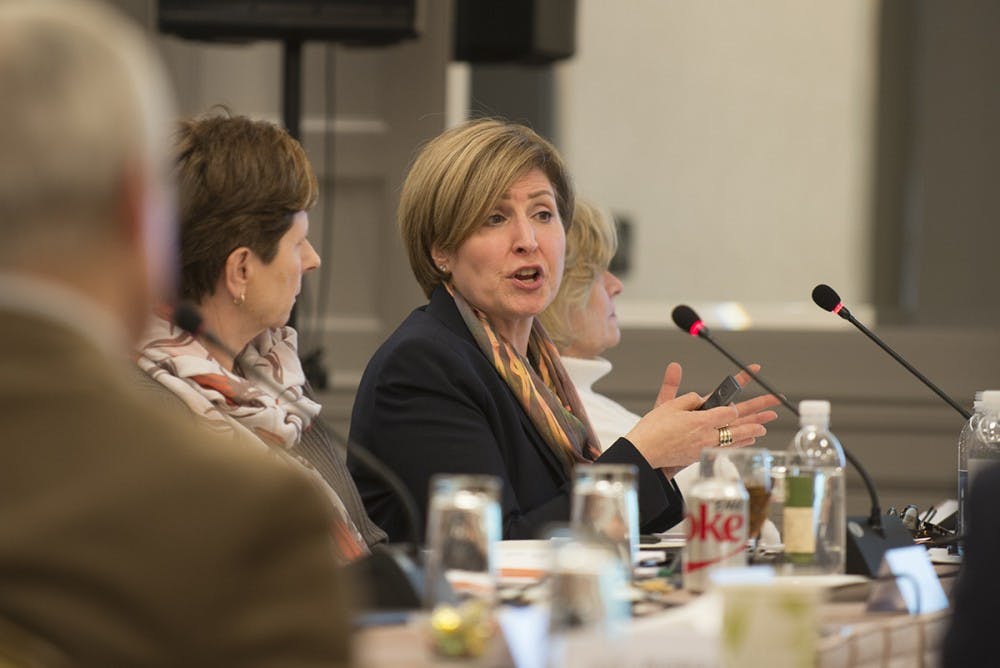University Architect Alice Raucher updated the Board of Visitors Buildings and Grounds Committee on the findings of the Ivy Corridor Land-Use Suitability Study last week, suggesting safety, infrastructure and aesthetic improvements to the Ivy Corridor.
The Ivy Corridor spans from Emmet Street West to Copeley Road. This area includes the Cavalier Inn, the Villa and the Emmet/Ivy parking garage. Altogether, the Ivy Corridor includes about 14 acres of land.
The goal of the Ivy Corridor development project, according to a previously passed resolution, is to improve the “safety, appearance and functionality” of the Emmet/Ivy intersection.
At the committee’s meeting last Wednesday, Raucher listed some of the Ivy Corridor Land-Use Sustainability Study’s findings, including a need for flexible and interdisciplinary classrooms, performance spaces, student housing and conference facilities. Raucher showed scalar comparisons to existing, similarly sized facilities at other universities including Virginia Tech, North Carolina Chapel Hill and Cornell University.
Raucher then went through five possible scenarios for the Ivy Corridor, including moving the Batten School of Leadership into the Ivy Corridor. The presentation was followed by a discussion of some of the benefits and drawbacks of each proposal. Vice Rector James Murray raised some concerns about parking accessibility, as much of the street parking would be eliminated.
The project also seeks to enhance the accessibility and connectivity of Grounds by opening up the area to increased pedestrian and bicycle traffic. The improvements planned for the area include widening the sidewalks, increasing green space and improving the infrastructure.
“From the very start, this was seen as a real connection between North Grounds and Batten, the Law School and Central Grounds,” Raucher said.
A key takeaway from the study was the need to improve student and pedestrian access to the renovated space. One of the ways in which Raucher proposed to do this was by reducing the number of curb cuts — places where cars pass can over the sidewalk — from eight to three.
“We want to think about pedestrian and public transportation access,” Raucher said. “When we thought about this, we really wanted to make this a safer, wider walkway.”
One concern this project specifically attempts to address is the need for hospitality spaces for people visiting the University — hotels, conference centers and the like.
As part of the redevelopment plan, the Cavalier Inn and Villa Diner will both close after final exercises in May. The Villa Diner will open in a different location in Charlottesville in July. The inn will be rebuilt in the Emmet-Ivy Corridor, but the exact space in which the inn is currently located will be replaced with green space.
The Board is taking a phased approach to the redevelopment of the Ivy Corridor. Phase I began in June 2017, and is focused on the area from the Emmet/Ivy intersection to Ivy Road. In the next year, site preparation, demolition of buildings, and construction will commence. Phase I is predicted to conclude in August 2020. As of the meeting Wednesday, a timeline for Phase II was not yet available.
Going forward, the results of the Ivy Corridor Sustainability Study will inform the committee’s discussion of plans for future development.
The design phase of the project is slated to begin in February. The next step in the development of the Ivy Corridor is for the Board to approve the concept, site and design guidelines for the hospitality and conference spaces in the plan.
Rector Frank M. “Rusty” Conner III said he hoped to vote on the plan during either the March or June Buildings and Grounds Committee meeting.







